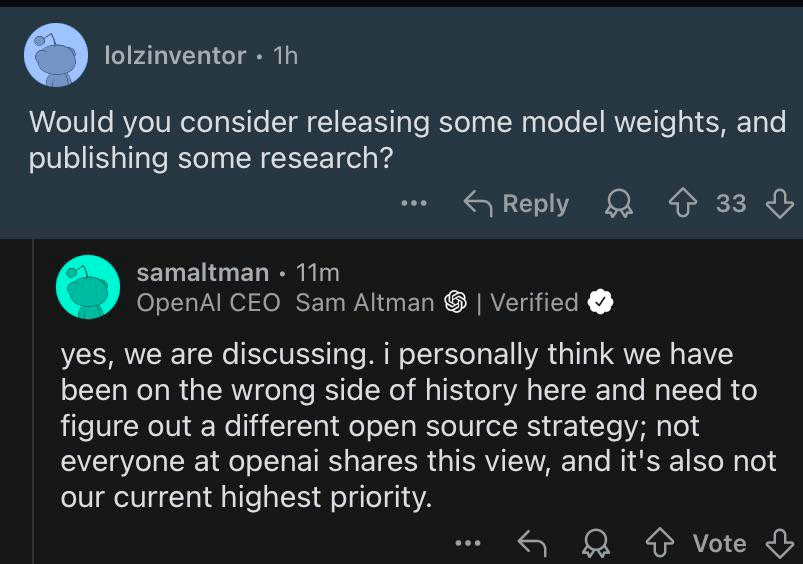- Dotika
- Posts
- AI Breakthrough: OpenAI's o3-mini
AI Breakthrough: OpenAI's o3-mini
ALSO : OpenAI’s Deep Research Speeds Up Analysis


Hey Synapticians,
We hope you had a great weekend under the sun and the cold 😉 On our side, it was awesome: a curious mix of Paddington in Peru and coding to prepare a new feature that promises to be a lot of fun… Stay tuned later this week!
This Monday is almost entirely dedicated to OpenAI’s announcements. We’re starting to wonder if they have dozens of pre-developed features in stock that they release whenever their competitors give them trouble #DeepSeek. On the agenda: a new reasoning model O3 mini, a new search feature, video integration in ChatGPT, and finally—elevating (not lifting the skies ;)) our discussions—a Vatican (!) essay on human and artificial intelligence.
Happy reading, happy Monday, and have a great week!
Top AI news
1. OpenAI's o3-mini: Faster, Smarter AI Model Released
OpenAI has unveiled o3-mini, a faster and more capable reasoning model excelling in STEM fields, now available for free in ChatGPT. This model is faster and more capable than its predecessor, o1. External experts preferred o3-mini's answers 56% of the time and found 39% fewer serious errors on complex questions. The model offers three "reasoning-effort" settings—low, medium, and high—allowing developers to balance speed and accuracy based on their needs. The free version of ChatGPT uses the medium setting, providing a balanced trade-off between speed and accuracy, while paying users can select the high setting for tasks requiring greater precision. Additionally, o3-mini introduces a search function that provides current answers with links to web sources, though this feature is still in the prototype stage. For API users, prices are 93% lower than o1, making o3-mini more accessible to developers.
2. OpenAI's Deep Research: AI Revolutionizes Online Research Efficiency
OpenAI has introduced "deep research," a new ChatGPT feature that autonomously performs complex, multi-step internet research tasks. Powered by the OpenAI o3 model, optimized for web browsing and data analysis, this agent plans and executes research trajectories to gather and synthesize information from various online sources, including text, images, and PDFs. Users can submit questions with additional context through text, images, or PDFs, and the system responds within 5 to 30 minutes, providing process summaries with citations. Despite its capabilities, "deep research" has limitations, such as distinguishing authoritative information from rumors and accurately conveying uncertainty.
3. ChatGPT App Now Supports Video and Screen Sharing in Europe
OpenAI has expanded its ChatGPT app's capabilities in Europe by introducing video and screen sharing features. Users in the EU, Norway, Iceland, Liechtenstein, and Switzerland can now conduct video calls and share their screens directly through the mobile app. To access these features, users must update to the latest version of the ChatGPT app. Currently, these functionalities are exclusive to the mobile platform and require a stable internet connection for optimal performance. This update enhances ChatGPT's role as a comprehensive communication tool, integrating text, voice, and visual interactions.
Bonus. Vatican Issues Note on AI and Human Intelligence
On January 28, 2025, the Vatican published "Antiqua et nova," a note examining the relationship between artificial intelligence (AI) and human intelligence. Developed by the Dicastery for the Doctrine of the Faith and the Dicastery for Culture and Education, the document explores the anthropological and ethical challenges arising from rapid AI advancements. It emphasizes the need for responsible use of AI, ensuring it serves the common good and respects human dignity. The note warns of potential risks, including the spread of misinformation, dehumanization of interpersonal relationships, and excessive automation across various sectors. It calls for careful regulation and ethical reflection to ensure AI complements rather than replaces or diminishes human intelligence.
Reddit of the Day
Wrong side ?

Theme of the Week
AI Generated Music - Concept explained of the week
AI-generated music is when a computer creates music by itself using artificial intelligence. Imagine teaching a robot how to compose songs by feeding it thousands of tracks. The AI learns patterns, rhythms, and styles, then generates new music based on what it has learned. Think of it like a chef-in-training: If you give a chef a thousand recipes, they will eventually learn how to combine ingredients in creative ways. Similarly, AI studies existing music and then "cooks up" new songs!
Stay Connected
Feel free to contact us with any feedback or suggestions—we’d love to hear from you !

Reply